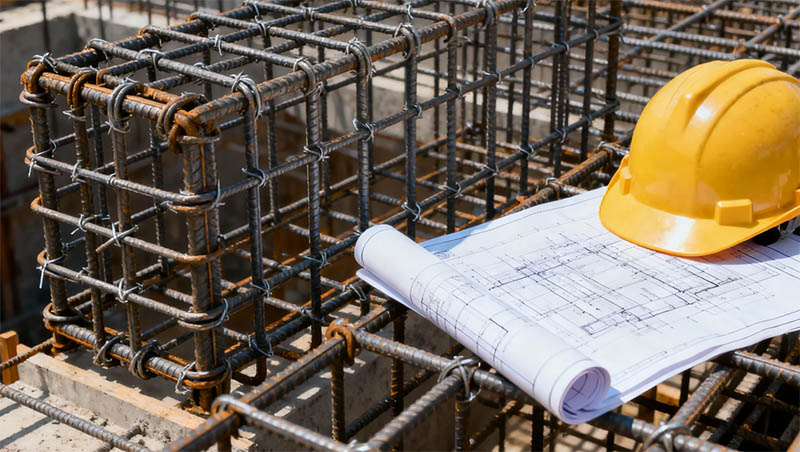Steel Plate Weight Calculator (kg, lb, tonne)
2861Use our steel plate weight calculator to quickly estimate steel weight for carbon, stainless, or galvanized sheets.
View detailsSearch the whole station

In reinforced concrete construction, rebar (reinforcing steel bars) plays a crucial role in improving strength, ductility, and structural reliability. Among all rebar standards, ASTM A615 rebar is one of the most widely used worldwide, known for its versatility and cost-effectiveness in concrete structures — from residential slabs to large-scale bridges.
This guide explores the main rebar applications in modern construction — including columns, walls, foundations, driveways, patios, beams, stairs, and even countertops — along with selection tips for choosing the right grade.
👉 For detailed chemical composition and mechanical property data of ASTM A615 rebar, refer to our in-depth guide:
ASTM A615 Rebar Standard (Latest Version): Grades, Chemical Composition, and Mechanical Properties
Concrete columns are key load-bearing elements that support vertical loads from beams and slabs. Proper rebar selection ensures strength and ductility under compressive and tensile stress. For multi-story or heavy-duty structures, ASTM A615 Grade 60 rebar is the most common choice, providing a balance of strength and workability.
Procurement & Selection Tips:
When sourcing column rebar, confirm compliance with ASTM A615 (latest version) for consistent tensile performance. Grade 60 is ideal for high-rise and bridge columns requiring superior load capacity.
👉 Learn more on our ASTM A615 Grade 60 Rebar page.
Concrete wall rebar is essential for stability and crack control in both structural and retaining walls. Blockwork (CMU) also benefits from vertical and horizontal reinforcement to resist lateral forces like soil pressure and wind.
Procurement & Selection Tips:
Use Grade 40 rebar for standard residential block walls and Grade 60 for retaining or basement walls under heavy stress. Proper bar spacing (typically 16–24 inches) enhances crack resistance.
👉 View our detailed specs for ASTM A615 Grade 40 Rebar.
Foundations transfer the building load safely to the ground. Foundation rebar increases resistance to shear and tension caused by uneven soil movement.
Procurement & Selection Tips:
a) On heavy-duty or industrial foundations, Grade 60 or Grade 75 rebar ensures durability under high compressive loads.
b) Consider pre-cut, bundled bars for efficient on-site installation.
👉 View product page for ASTM A615 Grade 75 Rebar.
Reinforced concrete stairs require proper tension reinforcement to prevent cracking under dynamic or thermal stress.
Procurement & Selection Tips:
a) For narrow or residential stairs, use small-diameter Grade 40 rebar.
b) Industrial staircases or large flights benefit from Grade 60.
c) Ensure proper bending radius and bar overlap to maintain strength continuity.
Driveway rebar strengthens slabs that bear vehicle loads, while concrete patio rebar improves surface stability and longevity.
Procurement & Selection Tips:
a) Outdoor slabs need corrosion protection — use epoxy-coated or galvanized rebar when exposed to rain or de-icing salts.
b) For driveways, #4 or #5 Grade 60 bars spaced 12 inches apart are ideal.
c) For patios, welded wire mesh or #3 bars offer cost-efficient reinforcement.
Beams experience both bending and shear forces. Using the right rebar for beams ensures long-term durability and deflection control.
Procurement & Selection Tips:
a) Residential beams can use Grade 40, while bridges and industrial beams require Grade 75 for higher yield strength.
b) Confirm spacing, anchorage, and bending limits according to design codes.
Note: ASTM A615 rebar is not optimized for welding — for weldable bars, choose ASTM A706.
Although smaller in scale, concrete countertops still benefit from internal reinforcement to prevent cracking or sagging. Decorative and outdoor countertop projects often use corrosion-resistant materials.
Procurement & Selection Tips:
a) Use galvanized or stainless steel rebar for decorative countertops to avoid rust stains.
b) #3 bars (10mm) are common for small countertops, while thicker slabs may use #4 bars.
c) For structural-grade options, ASTM A615 Grade 40 rebar ensures adequate stiffness.
The following table summarizes typical grade selections based on common structural requirements.
*Final specification should always be confirmed by a qualified structural engineer.
| Application | Recommended Grade | Notes |
|---|---|---|
| Columns | Grade 60 | Best balance of strength and ductility |
| Walls / Blocks | Grade 40–60 | Depends on wall load and height |
| Foundations | Grade 60–75 | For heavy loads or uneven soil |
| Stairs | Grade 40–60 | Based on size and function |
| Driveways / Patios | Grade 60 | Requires corrosion protection |
| Beams | Grade 75 | High-yield for large spans |
| Countertops | Grade 40 | For decorative or small structures |
When your specifications call for ASTM A615 rebar, CJM Steel provides global export expertise — helping you build safely, efficiently, and with peace of mind.
👉 Contact us today for quotations, stock availability, and size options.
Use our steel plate weight calculator to quickly estimate steel weight for carbon, stainless, or galvanized sheets.
View detailsLearn about the most used carbon steel plates in construction: Q355, S355, A572, A709, Q460. Ideal for frames, bridges, towers, and industrial structures.
View detailsLearn what carbon steel profiles are, their main types (I-beam, channel, angle), properties, and industrial uses. Find reliable carbon steel profiles suppliers.
View detailsUnderstand the key differences between carbon steel and alloy steel. Compare strength, cost, and best use cases. Expert buying tips from CJM.
View details
HelloPlease log in